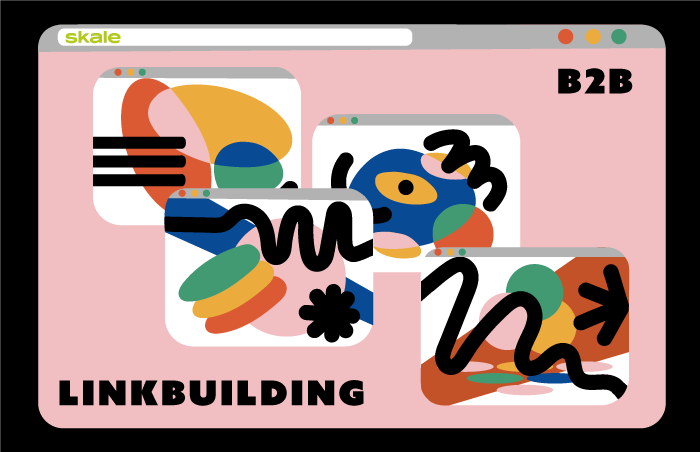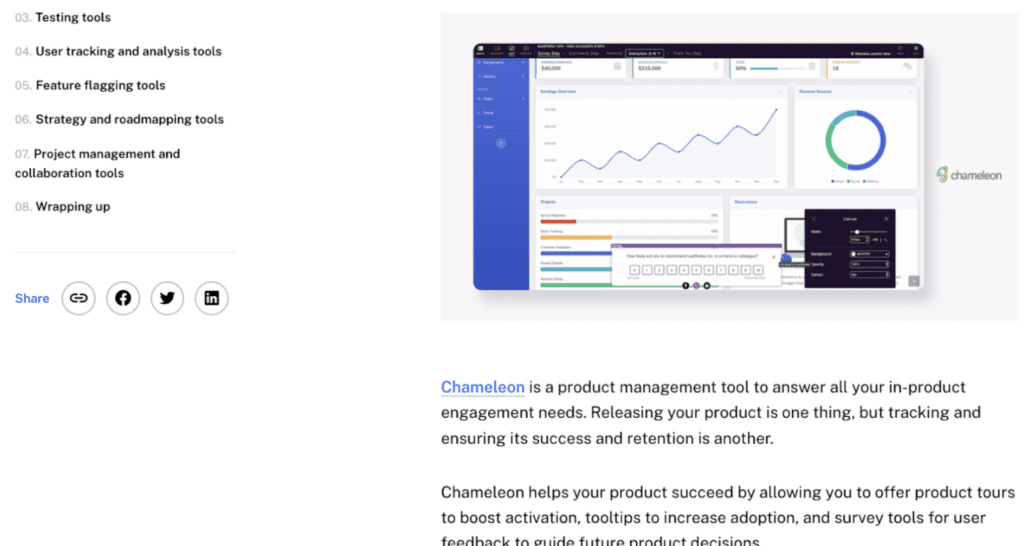
The Power of Partnership: 7 Benefits of Hiring a B2B SEO Agency
These benefits of hiring a B2B SEO agency illustrate why outsourcing your content can help you to drive new revenue for your business.


Drive serious MRR growth with Skale
Let the B2B SEO experts help you secure links that generate real impact
Schedule a callB2B link-building is a key factor in SEO strategy—one of Google’s top #3 ranking factors, in fact. You can’t have a successful SEO strategy without putting effort into building authority through backlinking to your website.
Skale has been doing SEO – and providing outreach & link building services for SaaS for quite some time, actually — and we’ve picked up some effective link-building tactics throughout. Here are 11 of those strategies to help your B2B business better understand and make use of link-building opportunities for SEO.
TL;DR: the 11 B2B link-building tactics experts use are:
However, we’d recommend letting a B2B SEO agency handle things. 😉
Link-building is important for a number of reasons, for example, to increase credibility, authority, and understanding of the context of the page that’s being linked to. This in turn helps improve your search engine ranking and makes it a powerful SEO practice for businesses big and small — but, how?
Ultimately, search engines decide what’s important for SEO and what’s not—we essentially just play by their rules. The guidance on backlinking is that it plays an essential part in your SEO campaign and that strategic backlinking efforts are a key step towards a high-ranking website.
Backlinks — links from an external website to one of your website pages — are like votes of confidence. Votes from reputable sources help build your domain authority and, over time, help to push your pages and the whole website to the top of search engine results.
Link-building is just one of the methods used by SEO experts, but alongside other methods, it’s a great weapon in your SEO arsenal. Search engine optimization — although the most important — isn’t the only reason for focusing on link-building.
Here are some other reasons link-building is important for B2B websites:
See? There are plenty of reasons that link-building is important for your business. We’ll stick to the SEO benefits, though — it’s kind of our thing. 😉
Read more about how we help you hit your SEO goals here.
B2B link-building requires SEO managers and specialists to dedicate ample time and resources to getting backlinks. It’s very much a quality-over-quantity approach—but realistically you need both quality and quantity.
B2B link-building often revolves around creating quality content within your niche that provides readers with exactly what they’re looking for at the stage of the funnel they’re in, providing them with unique information and expert insights that will truly answer their queries and needs. It’s about creating content pieces that people want and need in order to improve and grow — it’s not directly selling your product. (Here is a list of the top ranking B2B content marketing agencies).
Whether original research or podcasts, strategies are usually time-consuming and demanding.
It’s also heavily reliant on connections in your industry—connections that take time to source and turn into relationships. Many smaller B2B businesses will struggle to get the attention of key industry players that have the power to strengthen their domain authority, making strong inbound links harder to achieve.
That’s not to mention the need to understand “good SEO” and “bad SEO,” otherwise known as white hat and black hat SEO.
Despite the name, SEO isn’t black and white—there are great methods that make sense but could end up getting you penalized for being a black hat. Here’s an example of just that—pyramidal link-building, which consists in backlinking to your backlinks. This is what our very own SEO Growth Strategist, Jordi Cubiró, had to say about this method:
“So, you’ve got the main site at the top of the pyramid, then you point some backlinks to it. Those are your ‘TIER 1 Backlinks’. After that, you build some backlinks to your TIER 1 backlinks (those are your TIER 2 backlinks). This boosts the authority of TIER 1 backlinks and repercutes in the authority of the main site.” – Jordi, SEO Growth Strategist @ Skale
Jordi finishes by highlighting that this could be considered ‘a bit black hat-ish’ — so caution is advised. Distinguishing between “good” and “bad” SEO is a challenge for B2B businesses, and it can have heavy repercussions for domain penalties if done incorrectly.
Link-building is great for SEO — especially when backed up by appropriate keyword research — but it must be done right in order to secure your desired ROI within your allotted SEO marketing budget.

Get inspired by a real-life success story
See how Skale helped Piktochart beat unicorn Canva and 10x signups in 3 months
See hereVendors and partners are key advocates of your brand, and likely mention your business relationship on their website. Appearing on vendor and partner websites is a strong GTM strategy for many SaaS businesses when starting out and a great opportunity for building links to your own site.
When working with a partner or vendor, make sure they’re including a website link when mentioning your brand. You can further strengthen your connection by writing a guest post for the site—guest blogging is a link-building strategy we’ll dive into shortly—and include links back to a page on your website that you want to push.
Brand mentions can be unlinked or linked, and require different efforts to get your desired backlink. First, let’s look at unlinked brand mentions.
Unlinked brand mentions are times when another site has mentioned your business without linking to it. If you spot a post like this, your best bet is to research the author, shoot them a message, and kindly request they include a link back to your page.
This ensures that readers are able to easily access your page following its mention, and means one more backlink for your website.
Realistically, you’re not going to organically find every post that’s ever mentioned your brand. That’s why it’s a good idea to set up Google alerts for any website that mentions your business. That way, you’ll never miss an opportunity for a backlink.
Then we’ve got linked brand mentions. This involves reaching out to other websites that have linked to your homepage and asking them to link to a more relevant page of yours. It’s an essential element of successful link-building and a key factor in getting your most important pages to the top pages of search engines.
Every badge you see on any website typically includes a backlink. The best example of using badges to create backlinking opportunities is G2, their badges you’ve definitely seen on a number of different websites.
It makes a lot of sense—companies add the badges that highlight their high-ranking status and G2 gets a link back to their website.
In fact, G2 Customer Success Managers are trained to push clients to include the badge—and most importantly, the link—on their websites.
Press releases aid your SEO strategy indirectly. There was a time when they had had a direct effect, but then Google clocked on to how some brands were abusing this benefit by publishing unnecessary press releases purely to fill them with backlinks.
It worked for a while—companies were getting backlinks from respectable news websites with little effort. However, a couple of years ago, John Mueller, Webmaster Trends Analyst at Google, burst a lot of press release bubbles:
“We try to ignore links from things like press releases because we know in general companies put the press releases out themselves—so any links in there are essentially placed by themselves… I wouldn’t rely on press releases as a strategy for building up links.”
Editorial links are now mainly no-follow links, however, they are incredibly valuable. They often need more time, higher-quality content and they are way harder to get, but they can significantly help you to:
Funding and investor updates are key for keeping stakeholders in the loop. They’re also a good way to get featured on other websites—websites with strong referring domains like Mashable, Tech Crunch, and more.
These sites give strong votes of confidence for your website domain and getting featured on them is a big win for your B2B or SaaS link-building strategies.
Here’s an example of a well-known tech news site, TechCrunch, reporting on a funding update and backlinking to the source:
Check these stats about B2B podcasts:
Podcasts are definitely a great way to increase brand awareness, brand consideration, and even purchase intent. They are also a great way to get links back to your webpage of choice. Most podcasts also have a website on which they post their podcasts and any relevant information—like any businesses or tools that have been mentioned during the podcast.
It may seem like a lot of effort for one backlink, but is it really?
One member of your team is spending 30-40 minutes chatting about a topic they’re already competent in. They’re sharing their thoughts and advice on a platform that attracts your target audience.
Appearing on a podcast positions a speaker as a thought-leader, and it’s likely that many listeners will choose to further investigate them and their work.
Of course, not just any podcast will do. Aim to appear on a well-known podcast within your niche—it’ll do wonders for your B2B SEO strategy and brand exposure. Here are some top picks for B2B marketing podcasts to consider:
These podcasts highlight B2B success and strategies, and you should be aiming to get your best speakers on these and others like them.
Lastly, it’s important to know that Google has it’s own podcast platform and by following its prerequisites, you can have your podcast indexed by Google – making your overall SEO game even stronger!
Here are the prerequisites in case you were wondering:
A product roundup is an article on your blog, a social media post, or an email that features several products in the same category or according to a theme—think ‘The 5 top examples of…’ or ‘The 10 best…’ types of articles.
This is an easy way to acquire links on relevant sites without the hassle of guest blogging. You should actively reach out to websites if you think your product fits the roundup article topic—they’re typically open to updating.
It’s also a good idea to reach out to any website whose audience could benefit from reading an article or a resource on your website. Even if you aren’t featured in a roundup, they could point towards your content as a further source for learning.
Here’s an example from Maze’s website, where they’ve listed the top 13 product management tools for 2021. For number two, they’ve included links to the product management tool, Chameleon.

Guest blogging requires time and effort—but that time and effort really pays off. It’s a tried and tested link-building strategy.
Guest posting consists of building a relationship with another brand within your niche and offering them high-quality content. Sometimes you will get monetary rewards, but most times than not what you’ll get is a link back to your website or social media accounts.
With this method, you write an article showcasing your knowledge, expertise, or unique opinion and original insights on a topic, and if a site decides to publish this article they will reward you with a link back to your website. Of course, they’ll only decide to publish your work because they see it as relevant and that it will attract interest from their readers–so always focus on providing real value (original case studies, original statistics, research of another kind, embed a video and add your commentary, etc.) and showing that you are an industry expert.
When thinking of content ideas for your guest blogs, here are four simple pieces of content you can do:
Once you start receiving more and more backlinks from guest posting, the vote of confidence for your website will increase, and so will your domain authority gradually.
Original research in your industry is a smart approach to link-building, however, it’s no small task. That being said, here are three reasons you should put the effort in, because it will help you:
For example, Sona, a Social Care workforce management platform, published the ‘Appreciation Matters’ research. Others in the industry, like UK Care Week, have used this work as a reference–and included backlinks to Sona’s research and homepage in their own articles. A backlink and thought leadership win for Sona!
However, it’s important to mention that it does come with some downsides, for example:
But, we still think it has many more benefits than drawbacks. Figure out what it is your audience is most interested in and what kind of research they would like to see. Whether it’s experiments, analysis, aggregating existing research, online surveys, or even things like case studies, they will all have a very specific audience in mind–so find out which one is the best for your target audience. Here’s a part of original research for SEO from one of our co-founders, Italo Viale:
“In B2B I’ve seen that ‘in-depth reporting analysis’ on an Industry’s state or trends generates lots of attention and links to it.”
Product reviews are not only great for SEO, but also for social proof and lead generation. This backlinking tactic consists in offering your product—free of charge—to influencers and bloggers in your niche.
In exchange, they’ll publish a write-up on your product within a set amount of time from starting the free trial. It’s great for building authority, brand awareness, and potential new customers.
You can also garner product reviews from your customers—just ask. Give them the tools to review your product and incentivize them with affiliate links. It’s great to get your current customers talking about your product and sharing a sign-up link with their network.
Conferences provide a platform for you to share knowledge and insights in an area of your expertise. It’s a great tactic for getting high-quality backlinks that reach your target audience.
When one of your team speaks at a conference, their profile will appear on the relevant webpage with links to connect with them. Some of these will be social media links—to connect on LinkedIn and the likes—whereas others will be backlinks to your organization.
Here’s a speaker profile made for Nathan Latka at the annual Growth Marketing Conference. It includes a link to Nathan’s LinkedIn and Twitter profiles—both hugely influential for his personal brand and wider business goals.
This is another win-win SEO approach—you get a backlink AND the kudos of appearing on a conference panel as a thought leader.
B2B link-building is an arduous and time-consuming task. For 15 links a month on relevant websites, you’d need to put in about 212 hours worth of work. That’s substantially more than the 160 hours/month worked by full-time employees, and we’ve not even factored in other tasks—like answering emails and attending meetings.
Outsourcing your link-building efforts also provides some unique advantages that you couldn’t get if you decided to employ someone in-house and equip them with SEO tools. Here are some of the benefits an agency provides over an in-house SEO junior.
Bonus: Read more about the benefits of hiring a B2B SEO Agency.
There’s plenty more to building links than just SEO knowledge, you also need someone who can:
Realistically, you need a whole team of people to manage a comprehensive link-building strategy—that’s exactly what a B2B SEO agency provides.
An SEO agency’s exclusive offering is SEO expertise—they’ve spent years figuring out the best solutions to your SEO issues. Hiring an out-of-house agency to handle SEO frees up more time for you to focus on other business goals.
Alongside trying and testing various SEO tactics, SEO agencies have also spent years building up connections with key players in your industry. It’s a process that requires time, persistence, and knowing the right people.
They’ve got the connections you need to successfully improve your link-building efforts.
After years in the same organization, it’s easy to miss key opportunities due to a tunnel-vision approach. Skale CEO, Jake Stainer, recounts how he spent years at Typeform as an SEO Manager—but it was only after he left that he could finally see the wood from the trees.
An SEO agency can put fresh eyes and minds on your SEO goals, and find solutions you may never have stopped to think about.
These benefits are exactly what’s on offer at Skale—an entire team of SEO specialists who’ve got the experience to get you where you want to be. Just like we’ve done time and time again with our proven results, like:
Skale is the B2B Link-Building Agency that works—learn more about how we’ll approach your SEO wants and needs here. For now, we’ll leave you with what one of our clients has said about working with us:
“We’re a fast-moving startup with a growing marketing team. Using Skale has enabled us to focus on creating new landing pages and articles, while the Skale team takes care of off-page factors that we don’t have the time to deal with in-house.
I love seeing the quality links that they provide for us that give our Organic channels a massive boost, plus their team is a delight to work with!” – Kirsty, (Previous) Content Strategist @ Holded.

Build links that drive MRR growth
Partner up with a B2B link building agency and create impactful results
See Skale’s LB ServicesLearn more about
B2B SEO

The Power of Partnership: 7 Benefits of Hiring a B2B SEO Agency
These benefits of hiring a B2B SEO agency illustrate why outsourcing your content can help you to drive new revenue for your business.

15 B2B Customer Acquisition Strategies that Increase Revenue
Want to find new customers who truly value your business? We’re here to help you out with a list of the top 15 B2B customer acquisition strategies.

10 B2B SEO Automation Tools & Strategies to 10x Performance in 2024
Save time with the right B2B SEO automation tools and strategies that are sure to bring your marketing to the next level–we've listed them here.